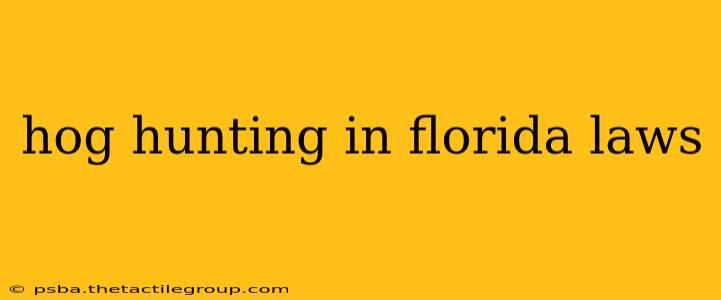Florida's wild hog population presents a significant agricultural and environmental challenge, leading to strict regulations surrounding their hunting. Understanding these laws is crucial for responsible hunters to ensure legal and ethical hunting practices. This guide delves into the key aspects of Florida hog hunting laws, helping you navigate the regulations and enjoy a safe and successful hunt.
Licensing and Permits: Your Gateway to Legal Hog Hunting
Before you even think about tracking down a wild hog, you need the correct permits. Florida's hunting regulations are designed to manage wildlife populations sustainably. This means securing the necessary licenses is the first – and most important – step.
Hunting License: The Foundation of Legal Hunting
A Florida hunting license is a fundamental requirement. This license isn't hog-specific; it grants you the privilege to hunt various game animals within the state, including hogs. You can obtain this license online through the Florida Fish and Wildlife Conservation Commission (FWC) website or at authorized license agents. Make sure your license is current and valid for the hunting season.
Specific Hog Hunting Permits (Where Applicable):
Depending on the location and type of hunting, additional permits might be necessary. Some private lands might require specific permissions beyond a standard hunting license. Always contact the landowner or land manager well in advance to clarify any permit requirements. Public lands often have their own rules and regulations that must be adhered to. Check the FWC website for specific details regarding public lands and any associated permits.
Understanding Florida's Hog Hunting Seasons and Methods
Florida doesn't have a closed season for hog hunting on private lands. This means, with landowner permission and the appropriate licenses, you can hunt hogs year-round. However, specific regulations apply to public lands. These regulations typically define specific hunting seasons, methods, and bag limits to maintain a healthy hog population and protect other wildlife. Always verify the current regulations for the specific public land you plan to hunt.
Legal Hunting Methods: A Look at What's Allowed
The FWC allows a variety of methods for hog hunting, but some are restricted depending on location. Common legal methods include:
- Firearms: Specific firearm restrictions might apply based on location (e.g., caliber restrictions, discharge distances from residences). Always check the relevant regulations for your hunting area.
- Archery: Archery hunting provides a more challenging and ethical approach, requiring precision and skill.
- Trapping: Trapping is a viable method, but you'll need to adhere to specific trapping regulations regarding trap types, placement, and check-in frequency.
Illegal Methods: Be aware of prohibited methods such as hunting from a vehicle (unless specifically authorized), using poison, or using methods that could endanger non-target species.
Bag Limits and Reporting Requirements
Bag limits for hog hunting can vary depending on the location and land ownership. On private land, bag limits are often less restrictive, but it's crucial to check with the landowner for any specific rules. On public land, bag limits are usually specified and must be strictly followed. Reporting harvested hogs might also be required depending on the location. Check the FWC website for the latest reporting requirements.
Landowner Permission: A Crucial Element
Hunting hogs on private land without explicit permission from the landowner is illegal and carries serious consequences. Always obtain written permission before hunting on private property. This permission should clearly state the dates, locations, and any specific regulations the landowner has established. This protects both you and the landowner.
Safety First: Ethical and Safe Hog Hunting Practices
Beyond adhering to legal requirements, responsible hunters prioritize safety. Always:
- Identify your target accurately: Ensure you can clearly identify your target before firing. Mistaking another animal for a hog can lead to severe consequences.
- Practice safe firearm handling: Always handle firearms responsibly, keeping them unloaded until ready to shoot and observing proper muzzle control.
- Be aware of your surroundings: Be mindful of other hunters and potential hazards in your hunting area.
Staying Updated: Resources for Florida Hog Hunters
The Florida Fish and Wildlife Conservation Commission (FWC) is the primary source of information on hunting regulations. Their website is regularly updated with the latest information on hunting licenses, permits, season dates, bag limits, and other relevant rules. Make sure to regularly check their site for any changes before heading out for a hog hunt.
This comprehensive guide offers valuable insights into hog hunting laws in Florida. Remember, responsible and legal hunting practices are crucial for maintaining the sustainability of wildlife and ensuring the enjoyment of this activity for years to come. Always consult the official FWC website and the relevant land manager for the most up-to-date information.

